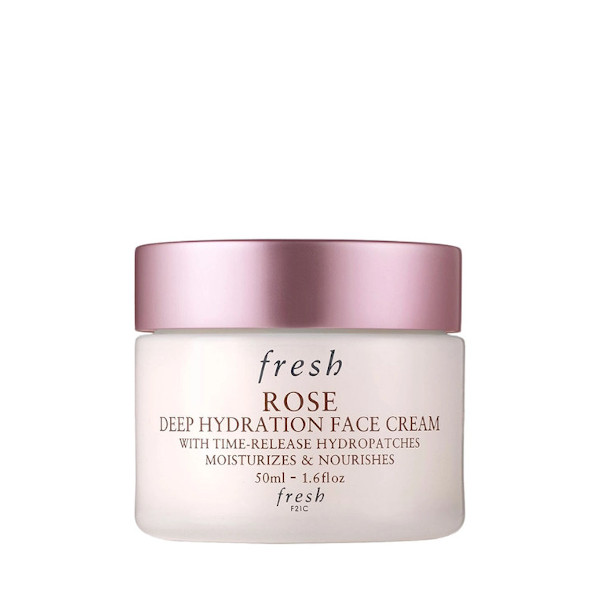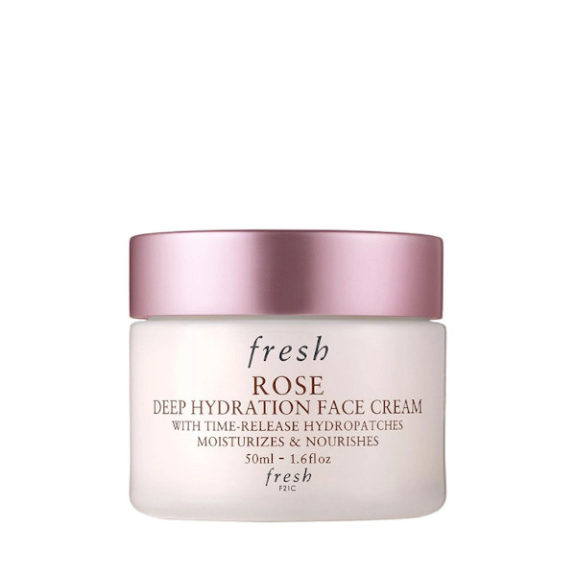Rose Deep Hydration Moisturizer

Expert Review
fresh’s Rose Deep Hydration Moisturizer is a brand bestseller. We are going to inspect the science behind the advertised statements (or claims) for this moisturizer.
Cosmetic Claims
fresh makes seven claims about their Rose Deep Hydration Moisturizer. The company says that these findings come from a test done on real people (in-vivo). However, we could not find any publically available details of such a study. We approached fresh about this in-vivo study, but their team refused to share the details with us and the public.
All the claims about this product include a reference to a specific time frame (such as 24h hydration), or the percentage of people who tested the product (97%, etc.). Because these claims are so specific, they really need scientific evidence to support them and cannot be scored based only on the listed ingredients.
-
Acts like a moisture magnet, attracting and increasing it for 24-hour deep hydration.
-
97% felt their skin was moisturized and nourished
-
94% noticed their skin was instantly hydrated
-
94% said it provided long-lasting comfort and relieved the tightening sensation due to dry skin
-
94% felt their skin was supple and smooth
-
91% reported it soothed skin and protected against dryness
-
91% noticed their skin was soft
Legend
Ingredient review and safety:
Let us have a look at the ingredients, and if they can give us more clues about how this moisturizer can perform on your skin.
Water, Glycerin, Ethylhexyl Isononanoate, Butylene Glycol, Pentylene Glycol, Propanediol, Caprylyl Methicone, Isostearyl Isostearate, Dimethicone, Behenyl Alcohol, Nylon-6/12, Steareth-2, Xanthan Gum, Prunus Domestica Seed Oil, Rosa Damascena Flower Water, Algin, Angelica Keiskei Extract, Acacia Senegal Gum, Cucumis Sativus (Cucumber) Fruit Extract, Rosa Damascena Flower Oil, Sodium Hyaluronate, Tocopheryl Acetate, Ammonium Acryloyldimethyltaurate/Vp Copolymer, Steareth-21, Polyacrylamide, C13-14 Isoparaffin, Acrylates/C10-30 Alkyl Acrylate Crosspolymer, Tromethamine, Dimethiconol, Laureth-7, Tetrasodium EDTA, Caprylic/Capric Triglyceride, BHT, Caramel, Serine, Parfum (Fragrance), Phenoxyethanol, Citronellol, Geraniol.
Allergen free?

Citronellol
Geraniol
Maximum concentrations do not exceed use guidelines?
Preservative free?

Phenoxyethanol
Maximum concentrations do not exceed use guidelines?
EU restricted ingredient free?

Polyacrylamide
Tromethamine
Maximum concentrations do not exceed use guidelines?
We can immediately see that there is a high percentage of ingredients that can help maintain skin in good condition (such as glycerin, butylene glycol, and pentylene glycol).
Citronellol and Geraniol are ingredients that have a fragrance function. They can act as a dermal sensitizer and in the EU it are classified as fragrance allergens, causing allergic reactions in some individuals who are sensitive to it. IFRA recommends limiting citronellol to a maximum of 13% for eye creams and 3.2% for facial moisturizers and geraniol to a maximum of 5.1% for eye creams and 1.2% for facial moisturizers.
Preservative Phenoxyethanol is generally considered safe for use in cosmetics, with maximum concentrations of up to 1%.
Lastly, there are cosmetic use restrictions for Polyacrylamide and Tromethamine. Polyacrylamide is an ingredient that produces a thin coating on the skin and adds cohesion in a cosmetic product. In the EU, because of increased cancer risk with lifetime exposure in cosmetic products, residual acrylamide is limited to <0.1 ppm in body care leave-on products. However, CIR limits for residual acrylamide are 50 times higher. Tromethamine in cosmetics is mostly used to stabilize the pH. In cosmetics, it is often considered safe in concentrations of around 2%. The EU requires that tromethamine needs to have minimum 99% purity when used in cosmetics-as impure tromethamine in cosmetics can form N-nitrosamines, which are known carcinogens.
We reached out to fresh about these fragrance allergens, preservatives, and restricted ingredients, to confirm whether these ingredients follow the CIR/EU safety guidelines, but they declined to comment.
Conclusions
Pros
- May help maintain skin in good condition, but we found no scientific evidence is available to confirm this
Cons
- fresh’s team rejected to share with the consumer evidence of studies that would be able to support any beneficial claims they make about this moisturizer.
- Listed ingredients contain fragrance allergens and ingredients that are subject to safety use restrictions. We could not confirm if the preservatives listed here follow the common safety guidelines and to what extent

 Buy now
Buy now 